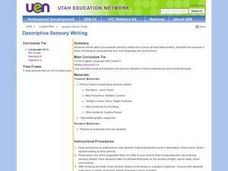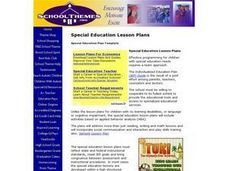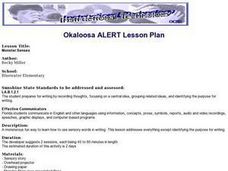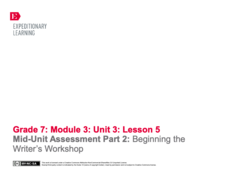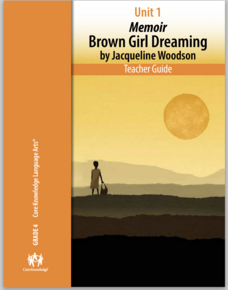Curated OER
Descriptive Prompt: Precise Language
Incorporate sensory details into a piece of descriptive writing. First, elementary and middle schoolers improve a piece of writing by using precise, vivid language, as well as appropriate word choice. They then listen to a variety of...
Curated OER
Logs, Charts, and Journals: What's On Your Plate?
Have your writers identify and use words that appeal to the senses. They create a chart of sensory words and record some of their favorites, then write a journal entry in which they describe eating at a restaurant using sensory details....
Curated OER
Narratives
Add to the narrative writing experience. Elementary or middle school writers listen to the teacher read a descriptive passage, then reread the same passage silently. They highlight sensory details and figurative language, then orally...
Curated OER
Come To Your Senses
Write narratives that include ideas, observations, or memories of an event or experience, and be sure to use concrete sensory details! Groups utilize a few of the famous I Spy books in order to create narratives that utilize sensory...
Curated OER
Lesson Plan 12: Writing With All Your Senses
What does an ice cream sundae sound like? Challenge young writers to move beyond visual descriptions and craft details that appeal to all five senses. The examples provided by the script in this resource show pupils how to create rich...
Curated OER
Special Education Plan
Special needs students practice completing everyday tasks such as organizing a day plan, reading a clock and completing simple math problems. They define the proper learning techniques for their disorder and utilize props in learning...
K20 LEARN
Sweet and Savory Writing: Descriptive Writing
The engagement is in the details. Young scholars learn the benefit of weaving descriptive and sensory details into the fabric of their writing through the activities in this lesson plan. As their hands explore items concealed in bags, a...
T. Smith Publishing
Your Five Senses
Using the five senses is a creative way to write descriptively. Learners read 25 words, both nouns and verbs, and place them into the category labeled with the correct sense.
K20 LEARN
Who's Coming To Dinner? Descriptive Writing
"The Dinner Party" is the anchor text in a lesson designed to encourage writers to use sensory details in their stories. After brainstorming descriptive words and phrases for the five senses, class members read Mona Gardner's stark tale...
Curated OER
Monster Senses
Second graders listen to a story that contains many sensory words to describe an object. They listen a second time using a signal to indicate when they hear a sensory word. They write a short story about a monster using appropriate...
Curated OER
Picture Me with Words
Students search in newspapers for words that describe them or what they like. They gather the words and use them to create a self-portrait. They read "boring" sentences and rewrite them using more descriptive words. They write 10 word...
Curated OER
The Old Man and the Sea: Guided Imagery
What do you imagine when you think of the sea? Put on some ocean sounds, close your eyes, and listen to a guided meditation based on the imagery from The Old Man and the Sea by Ernest Hemingway. After class members listen to the...
Curated OER
Lesson Plan 18: Art Project! Design Your Own Book Cover
Finished your novel? What’s next? Designing the book cover, of course. But how to begin? After examining the covers of published books and noting the common elements of these jackets, young novelists design a front and back cover for...
EngageNY
Writing the Children’s Book: Day One
With a brief mini-lesson, scholars learn about using strong verbs, sensory details, and precise descriptions. Next, pupils continue working on their children's book storyboards before choosing their strongest pages for peer critiques.
EngageNY
Mid-Unit Assessment Part 2: Beginning the Writer’s Workshop
Writers learn about using sensory details as they revise bland sentences with more vivid language. Next, they begin writing the first drafts of their children's books, completing storyboards to effectively plan their writing.
Curated OER
Dear Diary
Work on narrative writing with this lesson, in which middle schoolers analyze the characters from a selected piece of literature and write narrative diary pieces as the character. They work to understand the point of view of the...
Curated OER
Borrowing Narrative Skills from Mr. Fletcher: Using a "Prompts in Reverse" Technique to Inspire Your Writers
Help your class find their writing voices with this lesson which uses the work of Ralph Fletcher to guide a "Prompt in Reverse" activity. Using the chapter "First Pen" from Fletcher's Marshfield Dreams, learners decipher what they...
Core Knowledge Foundation
Unit 1: Memoir - Brown Girl Dreaming by Jacqueline Woodson
The memoir, Brown Girl Dreaming by Jacqueline Woodson, is the focus of a unit designed for fourth graders. Scholars begin each lesson with a warm-up, then listen to a read-aloud of a section of the book. Pupils complete word work,...
Curated OER
Sensory Descriptors
Students feel items in a bucket and describe them using descriptive words. In this sensory descriptive lesson plan, students use words such as smoothe, rough, and bumpy.
Curated OER
Moving With Your Roots
Students dissect common words to study the origins of those words. In this language arts lesson, students study the Greek and Latin roots found in many words within English language. Students use dictionaries to fill out worksheets...
Curated OER
Color Poems
Students describe colors. In this descriptive writing lesson, students brainstorm color descriptions using all of the senses except sight. Students write poems including similes, sensory images, and interesting word choice. Examples are...
Curated OER
Awesome Animals
Sixth graders write descriptive narratives about animals. In this descriptive writing lesson, the teacher models how to write a paragraph with interesting sensory words and exciting verbs. Students choose a picture of an animal they want...
Curated OER
Polar Bear Literacy Activity
Students generate vocabulary words synonymous or related to "noise." In this literacy lesson, students listen to the book Polar Bear, Polar Bear, What do You Hear? by Bill Martin and Eric Carle and discuss the meaning of vocabulary words...
Poetry4kids
Evoking the Senses in a Poem
Budding poets choose a topic for a sensory-filled poem. Authors describe that topic using detailed language based on the five senses. Then, switch the senses to create a fanciful poem intended to add a touch of fun to the objective.


